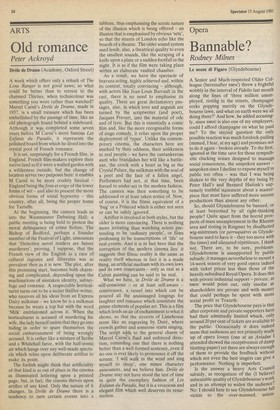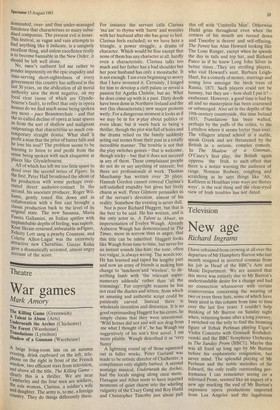Opera
Bannable?
Rodney Milnes
Le nozze di Figaro (Glyndebourne) A Senior and Much-respected Older Colleague (hereinafter smoc) threw a frightful wobbly in the interval of Fidelio last month along the lines of 'three million unemployed, rioting in the streets, champagne corks popping merrily on the Glyndebourne lawn, and what on earth were we all doing there?' And how, he added accusingly, since smoc is also one of my employers, could I afford champagne on what he paid me? To the second question the only possible reaction was much forelock-pulling (mimed, I fear, at my age) and promises not to do it again — broken already. To the first, ignored at the time save for those sympathetic clucking noises designed to massage social consciences, the unspoken answer — unspoken since I decline to expose myself in public too often — was that I was being shaken to the very depths of my being by Peter Hall's and Bernard Haitink's supremely truthful statement about a masterpiece that must have suffered more asinine productions than almost any other. So, should Glyndebourne be banned, or at least boycotted by all right-thinking people? Quite apart from the horrid prospects of mass unemployment in the Rheims area and rioting in Ringmer by disaffected wig-mistresses (or perruquieres as Glyndebourne used to have it — they too move with the times) and alienated repetiteurs, I think not. There are, to be sure, problems. Glyndebourne is unsupported by public subsidy; it manages nevertheless to mount a 14-week season of very good opera indeed with ticket prices less than those of the heavily subsidised Royal Opera. It does this with private industrial support — private, as smoc would point out, only insofar as shareholders are private and with money that could perhaps be spent with more social profit in Toxteth.
The price that Glyndebourne pays is that after corporate and private supporters have had their admittedly limited whack, only around 20 per cent of tickets are available to the public. Occasionally it does indeed seem that audiences are not primarily made up of opera lovers (one at an Ariadne attended showed the receptiveness of damp blotting-paper) yet there are always enough of them to provide the feedback without which not even the best singers can give a performance. Nothing is imperfect. Is the answer a heavy Arts Council subsidy, as recognition of the (I believe) unbeatable quality of Glyndebourne's work and in an attempt to widen the audience? No: I should hate to see Glyndebourne fall victim to the over-manned, union dominated, overand thus under-managed flatulence that characterises so many subsidised companies. The present evil is lesser. This festival, as vague and vain attempts to find anything like it indicate, is a uniquely excellent thing, and unless excellence really IS to become bannable in the New Order, it Should be left well alone.
No, smoc's outburst led me rather to Ponder impotently on the epic stupidity and time-serving short-sightedness of every government this country has suffered in the last 30 years, on the abdication of all moral authority save the most negative, on my local vicar (none of which are Glyndebourne's fault), to reflect that only in opera houses do we find much sense being spoken any more — pace Beaumarchais — and that the so-called decline of opera at least spares US from the sort of shallow and malignant outpourings that characterise so much contemporary straight drama. What shall it Profit a man that the price of butter falls and he lose his soul? The problem seems to be learning to listen to and profit from the sense being spoken with such eloquence at Places like Glyndebourne. All of which has left me too little space to drool over the second series of Figaro. In the first, Peter Hall broadened the idiom of his production with some perhaps overstated direct audience-contact. In the second, his associate producer, Roger Williams, gently toned this down and in collaboration with a fine cast brought a Classic production back to the level of its anginal state. The new Susanna, Maria Fausta Gallamini, an Italian spitfire with unplumbable depths of feeling, was superb. Knut Skram returned,unbeatable asFigaro, Felicity Lott sang a peachy Countess, and Colette Alliot-Lugaz was the extremely attractive new Cherubino. Gustav Kuhn gave a dramatically accented, almost angry account of the score.



































 Previous page
Previous page